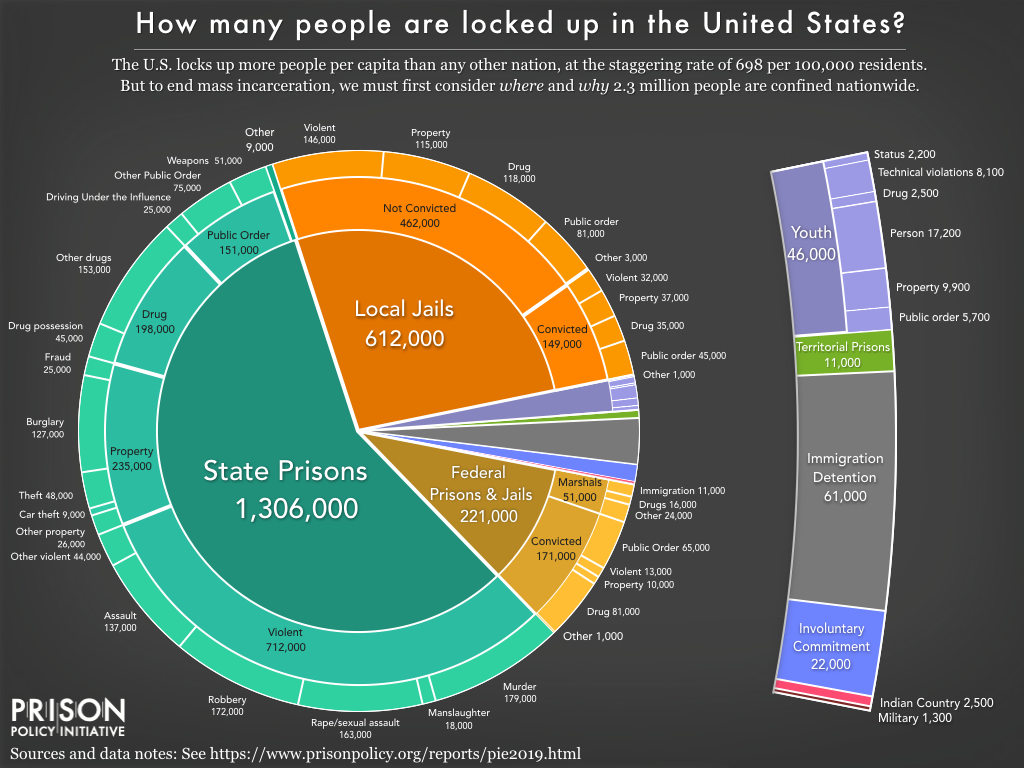Read more about InAlienable.
Support Quixote Center's InAlienable program!
InAlienable
Daily Dispatch
April 26, 2019

Prison Policy Initiative Releases New Numbers
The Prison Policy Initiative tracks the number of people incarcerated in the United States and their condition of incarceration. The numbers for 2018 were released in March, and they are staggering:
This report offers some much needed clarity by piecing together this country’s disparate systems of confinement. The American criminal justice system holds almost 2.3 million people in 1,719 state prisons, 109 federal prisons, 1,772 juvenile correctional facilities, 3,163 local jails, and 80 Indian Country jails as well as in military prisons, immigration detention facilities, civil commitment centers, state psychiatric hospitals, and prisons in the U.S. territories.
Another 3.6 million people are on probation, and 840,000 on parole - bringing the total number of people under state carceral supervision to over 6.7 million.
The section on immigrant incarceration includes details on different means of confinement. The total is 74,400 to 86,000 (see note below in passage) - this would be a daily average - and the number will certainly increase as Trump seeks additional funding for detention and ways around the Flores Settlement mandate that children be detained for no more than 20 days.
Turning to the people who are locked up criminally and civilly for immigration-related reasons, we find that 13,000 people are in federal prisons for criminal convictions of immigration offenses, and 10,600 more are held pretrial by U.S. Marshals. The vast majority of people incarcerated for criminal immigration offenses are accused of illegal entry or illegal re-entry – in other words, for no more serious offense than crossing the border without permission.
Another 49,000 [editor note: new numbers indicate this as high as 61,000] people are civilly detained by U.S. Immigration and Customs Enforcement (ICE) not for any crime, but simply for their undocumented immigrant status. ICE detainees are physically confined in federally-run or privately-run immigration detention facilities, or in local jails under contract with ICE. An additional 11,800 unaccompanied children are held in the custody of the Office of Refugee Resettlement (ORR), awaiting placement with parents, family members, or friends. While these children are not held for any criminal or delinquent offense, most are held in shelters or even juvenile placement facilities under detention-like conditions.
Another section of the report confronts different myths about mass incarceration, and this is well worth a review. One area where immigrant detention stands apart from the overall mass incarceration picture is the role of private prisons. While only 8% of those incarcerated are held in private prisons, this number is 75% for immigrant detention facilities - or well over half of all immigrants detained through all means of confinement.
Activist Spotlight: Yes, the Trump administration is surveilling attorneys, reporters and immigration activists
Opposing the Trump administration’s policies on immigration, or simply working to help immigrants receive due process at the border, has resulted in people being placed on watch lists, harassed at the border, and even monitored while working in Mexico by the Mexican government. Lauren Carasik writes in the Boston Review this week about the administration’s efforts to monitor the activity of activists, reporters and attorneys. The article details actions taken against attorneys working with Al Otro Lado and activists with Pueblo Sin Fronteras, and also points to filings with UN Special Rapporteurs that include 37 instances of harassment of activists and attorneys at the border. The monitoring seems to go beyond groups working at the border, as activists have been detained and hassled throughout the U.S.
She concludes:
For those working to illuminate the plight of migrants and to protect their rights, being singled out takes an undeniable toll. Since her codirectors were denied entry, Ramos has only left Mexico twice, but remains fiercely committed to her work: “Far from breaking the law, we are seeking to ensure that the U.S. government follows the law in its immigration practices—an effort the U.S. government appears to want to make harder by its surveillance and harassment of lawyers, media, and other imagined ‘instigators’.” The harassment of immigration activists, attorneys, and journalists warrants a congressional investigation and corrective action. Otherwise, democratic accountability and First Amendment freedoms may be yet further casualties of Trump’s war on migrants.

